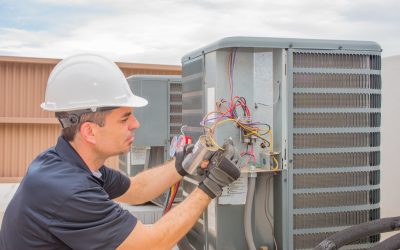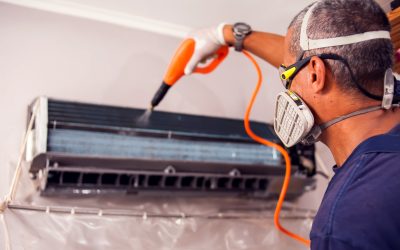Running a business in Glendale comes with a unique set of climate challenges. With soaring summer temperatures and long cooling seasons, businesses need HVAC systems that can handle extreme heat while staying efficient and low-maintenance. One solution that’s becoming increasingly popular is the rooftop HVAC unit—a system designed to meet the demands of commercial spaces while offering major operational benefits.
In this blog, we’ll explore why rooftop HVAC systems are a smart investment for Glendale business owners, how they work, their advantages, and what to consider before installation.
What Is a Rooftop HVAC Unit?
A rooftop HVAC unit, also known as a packaged unit, is a complete heating and cooling system housed in a single cabinet that sits on the roof of a commercial building. Unlike split systems that have indoor and outdoor components, rooftop units simplify installation and service by centralizing all HVAC functions in one place.
These systems are commonly used in:
- Office buildings
- Retail stores
- Warehouses
- Restaurants
- Light industrial spaces
Rooftop units come in a range of capacities and can be customized with add-ons like air purifiers, dehumidifiers, and advanced control systems. They’re built to withstand outdoor elements while delivering powerful, consistent climate control.
Benefits of Rooftop HVAC Systems for Glendale Businesses
1. Space-Saving Design
Floor space is premium real estate in any commercial building. By placing the HVAC system on the roof, businesses free up valuable interior space for operational needs, storage, or aesthetics. This is especially beneficial in small retail shops or restaurants with limited square footage.
2. Better Security and Reduced Vandalism Risk
Ground-level HVAC units can be targets for theft or vandalism, especially when located behind buildings or in open lots. Rooftop units are harder to access, providing a built-in level of security and reducing the risk of damage or tampering.
3. Efficient Zoning Capabilities
Many commercial rooftop HVAC systems are designed with modular functionality. This means you can control different areas of your building independently—perfect for offices, warehouses, or restaurants with varied climate needs in different zones.
4. Easier Maintenance Access
Since rooftop units are centralized and housed in one location, technicians can perform service checks and repairs without disrupting your indoor operations. This is particularly helpful during business hours, when you don’t want HVAC work to interfere with customers or employees.
5. High Efficiency and Modern Features
Most modern rooftop units are designed for high energy efficiency, offering SEER ratings that meet or exceed industry standards. Many systems also include features like:
- Smart thermostats
- Variable speed fans
- Economizers for using outside air
- Energy recovery ventilators
These enhancements can lower your monthly utility bills and reduce the environmental impact of your business.
6. Scalable for Business Growth
As your business grows, your HVAC system needs may change. Rooftop systems can often be upgraded or expanded without replacing the entire unit. This modular design allows for flexibility in planning and future-proofing your commercial space.
Why Glendale’s Climate Is Perfect for Rooftop Systems
Glendale’s hot, dry climate makes it a prime location for rooftop HVAC systems. These units are engineered to handle high temperatures and provide consistent cooling even during extreme heatwaves. Because of their location, they can take advantage of natural ventilation and heat dispersion without being obstructed by surrounding structures.
Additionally, Glendale buildings with flat or slightly pitched roofs are ideal candidates for rooftop HVAC installation. These structures simplify unit placement and provide easy access for routine maintenance and repairs.
The desert environment also means fewer problems with moisture or debris clogging the system, which is more common in humid or forested climates. With fewer environmental obstacles, rooftop units in Glendale operate more smoothly and last longer.
What to Consider Before Installing a Rooftop HVAC Unit
1. Roof Structure and Load-Bearing Capacity
Before installation, a structural engineer should assess your roof to ensure it can support the weight of the HVAC unit. Rooftop systems are heavy and require proper reinforcement and mounting.
2. Permits and Local Regulations
In Glendale, HVAC installation must meet specific building codes and zoning requirements. Work with a commercial HVAC contractor familiar with local regulations to avoid compliance issues and inspection delays.
3. Future Expansion
Consider choosing a rooftop system with modular capacity if your business plans to grow. Some units allow for the easy addition of new modules to accommodate expanded space or increased climate needs.
4. Maintenance Plans
To maximize your system’s lifespan and performance, enroll in a commercial HVAC service contract that includes routine inspections, seasonal tune-ups, and emergency response.
5. Energy Efficiency Ratings
Look for ENERGY STAR-rated rooftop units or systems with high SEER and EER ratings. These will provide better long-term savings and may qualify you for utility rebates or tax incentives.
Rooftop HVAC vs. Traditional Split Systems
While both types of systems have their pros and cons, rooftop HVAC systems offer a clear advantage for many Glendale businesses. Their compact, all-in-one design reduces installation costs and time. Traditional split systems, while effective, require more indoor space and complex ductwork.
Here’s a quick comparison:
| Feature | Rooftop HVAC | Traditional Split System |
| Space usage | On the roof (saves floor space) | Requires indoor and outdoor units |
| Maintenance | Centralized access | Multiple access points needed |
| Aesthetics | Hidden from public view | May be visible on property |
| Zoning capabilities | High | Moderate |
Boosting Your Business with Smarter HVAC Choices
A rooftop HVAC system doesn’t just save space or improve airflow—it helps you operate smarter. When customers enter a comfortable, well-regulated space, their perception of your business improves. For employees, it means fewer complaints, better morale, and higher productivity.
With fewer interruptions for repairs and greater energy efficiency, you’re also improving operational uptime and reducing costs. These seemingly small advantages add up over time, allowing your business to allocate resources toward growth and innovation.
Additionally, Glendale businesses that invest in sustainable, energy-conscious solutions position themselves as responsible community leaders. Customers increasingly appreciate businesses that prioritize energy efficiency and long-term environmental stewardship.
Investing in Glendale’s Future
Choosing the right HVAC system is about more than comfort—it’s a strategic investment in your business’s infrastructure. A rooftop HVAC unit can improve energy efficiency, minimize disruptions, and create a better environment for employees and customers.
As Glendale continues to grow, local businesses that invest in efficient, future-ready HVAC solutions will be better positioned to scale, serve more clients, and operate sustainably. By partnering with a trusted commercial HVAC company in Glendale, you ensure professional installation, code compliance, and top-tier maintenance support.
Final Thoughts
If your Glendale business needs a reliable, space-saving, and energy-efficient climate control solution, a rooftop HVAC system could be the answer. From improved airflow and zoning to lower maintenance interference, these units offer a practical solution for commercial properties of all types.
Work with a local expert to assess your needs, inspect your structure, and select the right model. With proper installation and maintenance, a rooftop HVAC unit can deliver consistent comfort and long-term value for your business.

